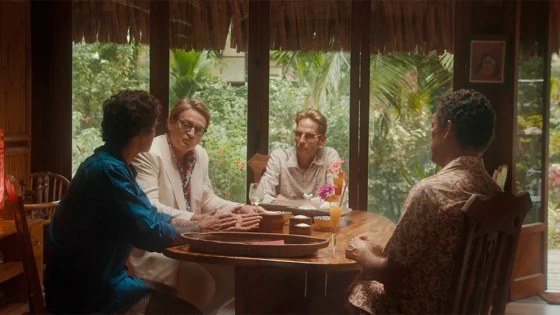CS91 Editor’s Note

By Mark Peranson
It’s that time again. Over the last two decades in these pages I’ve spent way too much time (at great personal anguish) trying to come to grips with the experience of the Festival de Cannes even if by this point in the history of film journalism, a few weeks after the fact everything anyone could say about Cannes has already been said. But I know that many readers take vicarious pleasure from reading my report, so as long as we keep going, or until Cannes hires me, I guess I’m stuck doing it.
This year, along with the usual half-serious bitching, I chose to focus in depth on only one title of which I hopefully am able to provide a modicum of unique insight, Albert Serra’s Pacifiction. So, I did not take my opportunity to discuss the small number of other favourites, either because they will be covered in future issues, like Kelly Reichardt’s personal art-school dramedy Showing Up, or because other writers took the lead and agreed to conduct interviews with their filmmakers, in particular, David Cronenberg’s return to the Cronenbergian Crimes of the Future and Lucien Castaing-Taylor and Véréna Paravel’s corporeal crash De Humani Corpus Fabrica, the latter of which—unlike the former—in no way posits that surgery is the new sex.
These last two films were naturally linked by many critics looking for connections between Cannes titles due to their artistic focus on the body—Cronenberg even expressed a desire to see De Humani in interviews, and he should—though nobody made the leap to include Claire Denis in the conversation, maybe because her focus on the flesh in Stars at Noon remains very much on the surface, but likely because the collective press corps, who had to see the film at 10:30pm due to Elvis being 159 minutes long, slept through most of it. But, hey, Elvis sure had a hell of a life.
But back to the future. Crimes of the Future is Cronenberg’s first original script since eXistenZ in 1999, which sees the return of one of the least-discussed elements of the filmmaker’s fetishes: Cronenberg’s near-pathological tendency to have his characters call each other by their downright wacky proper names. In eXistenZ, a film where everyone is speaking an accent save Jennifer Jason Leigh (possibly the film’s best meta-joke), Cronenberg gave us such classics as Ted Pikul, Allegra Geller, Kiri Vinokur, and, best of all, Yevgeny Nourish—in Crimes of the Future, one finds Saul Tenser, Lang Dotrice, and, in a future where I guess single monikers are in the process of becoming predominant, Caprice, Timlin, and, best of all, Wippet (though Willem Dafoe’s character in eXistenZ did go by the memorable name “Gas”). Messrs. Nourish and Wippet are both played by walking Canadian Heritage Moment Don McKellar, here making his welcome return to the Cronenberg universe for the first time since eXistenZ, and, unlike that film (which was very divisive upon its Berlinale premiere), oh how he has aged.
So how else to get a modicum of unique insight into Crimes of the Future’s production and themes than by asking McKellar himself to interview the filmmaker, and all thanks to Don for agreeing to do it. Their confab took place as a video chat a few weeks before the film’s premiere, with McKellar in Toronto and Cronenberg in Paris doing advance press. And, yes, assholes, we gave you ninja Viggo for the cover, not just because Crimes of the Future happens to be the only Greek-shot Canadian film premiering this year in the Cannes Competition. As I’ve said before, big high-resolution stills are just as important of a deciding factor as to cover placement, so producers and publicists take note. Bribes also work.
Mark Peranson

